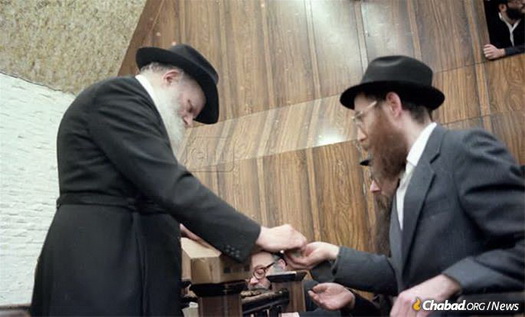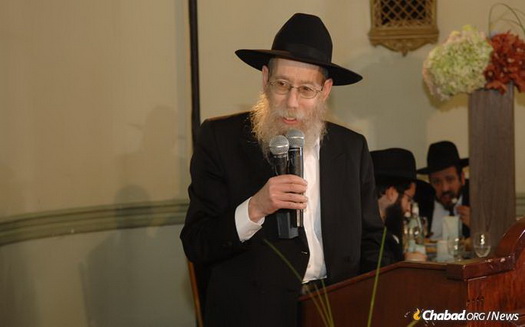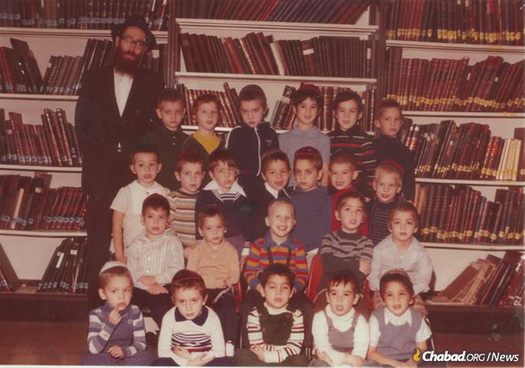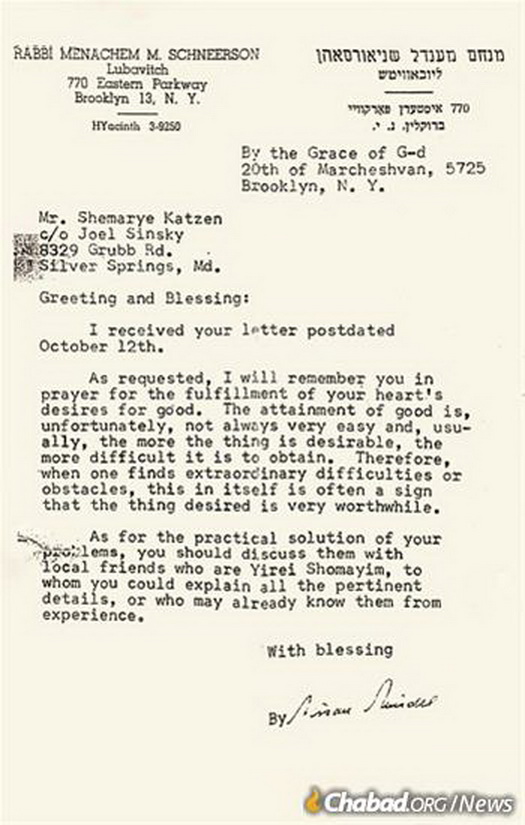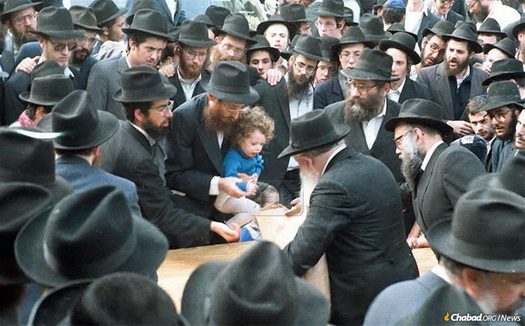
Rabbi Shmarya Katzen, 76, Dedicated and Beloved Teacher of Generations
by Mordechai Lightstone – chabad.org
At the age of 20, Rabbi Shmarya Katzen was at a crossroads in life. An engineering student enrolled at the University of Maryland in 1964, he was filled with a strong sense of yearning for a deeper sense of purpose in life.
After a conversation with graduate student Joel Synsky, Katzen decided to travel to the Crown Heights neighborhood of Brooklyn, N.Y., to spend the holiday of Shavuot with Chabad-Lubavitch Chassidim. Mesmerized by what he saw and experienced, Katzen would later recall that he knew then and there that he had found the purpose his life needed. The decision to make that journey would ultimately impact not only his life, but the lives of countless others.
Katzen, who passed away Sept. 22 at the age of 76, became a dedicated teacher, educating thousands of children in Crown Heights, filling them with a love and reverence for G‑d and Torah.
Katzen was the youngest of three children born to Irene (Chaya) and Lewis (Yitzchok) Katzen in Baltimore. Raised in a traditional Jewish family, Katzen suffered the loss of his father at an early age. In high school, Katzen was already attracted to his Jewish heritage—at one point briefly studying with a student at a local yeshivah. After a semester at Drexel University in Philadelphia and a stint at a solid-mechanics lab at the University of Maryland, Katzen switched to studying engineering at the university.
The trip that Shavuot to Brooklyn had served as a revelation to Katzen. When he returned to Maryland, he began keeping kosher and Shabbat. Staying with Synsky, who later became a professor of physics at UMD, Katzen continued his studies at the school. But the inspiration he gained from the Rebbe—Rabbi Menachem Mendel Schneerson, of righteous memory—kept drawing him back to New York.
When he finished the semester, Katzen made the trip back to Crown Heights, where he spent the summer studying at the Central Lubavitcher yeshivah located in the synagogue at 770 Eastern Parkway. Returning at the end of the summer, he spent two weeks back at university, before deciding once and for all he wanted to enroll in yeshivah. Before leaving, he wrote to the Rebbe, formally sharing his aspirations to join the yeshivah, and a general request for blessings and guidance in the face of difficulties he perceived. But he received no reply.
When he returned to Crown Heights, Katzen found out that the Rebbe had indeed penned a response, though it remained unsent in the Secretariat’s office.
“As requested,” the Rebbe wrote in part, “I will remember you in prayer for the fulfillment of your heart’s desire for good. The attainment of good is unfortunately, is not always very easy and, usually, the more the thing is desirable, the more difficult it is to obtain. Therefore, when one finds extraordinary difficulties or obstacles, this in itself is often a sign that thing is desired is very worthwhile.”
Katzen took part in classes arranged by Rabbi Yisroel Jacobson in 770 specifically for students who lacked a traditional yeshivah education. These classes eventually became the Hadar Hatorah Yeshivah for returnees to Judaism—the first such school of its kind. After studying at the Rabbinical College of Canada in Montreal, he married Rivka Schifman.
Initially setting up their home on Eastern Parkway a few doors down from Hadar Hatorah, the Katzen household was open to scores of college students and young adults taking part in the Pegishas, the popular encounters with Chabad, and guests of all backgrounds.
Guidance on a Career
When Katzen asked the Rebbe for guidance on a career to pursue, the Rebbe took the unusual step of suggesting that he take an aptitude test to determine his ability and future success.
The resulting personality test told Katzen the “he would be suited in a job that helps people.” Upon hearing that, the Rebbe instructed him, “If you want to help people, you should become an educator.”
For the next 47 years, Katzen dedicated himself to the task of educating young children in the timeless method of Jewish pedagogy.
Teaching young children the very basics of the alef-bet and daily prayers at United Lubavitcher Yeshiva, Katzen imbued a gentle love and fiery enthusiasm, taking special care—as the Rebbe instructed him—to help build each child’s sense of confidence.
Katzen’s influence extended beyond his immediate class of students. He ran Mesibos Shabbos, the Shabbat gatherings held for children in 770, and children’s rallies for Tzivos Hashem. In time, he began to teach not only the children of his former students, but their grandchildren as well. Many of his students became teachers themselves, others became emissaries of the Rebbe—meaning that Katzen impacted not just the countless children in Crown Heights, but hundreds of thousands of Jewish children attending Chabad day schools, camps and other educational institutions around the world.
In the late 1980s, Katzen took a few days off to rest his voice. After he wrote to the Rebbe about the move, the Rebbe asked him if that break from teaching was of greater importance than teaching Jewish children. Katzen took the instruction seriously, teaching his charges even when physical and other factors made it difficult. The morning of the heart attack that ultimately took his life, Katzen led the communal hachnasah l’cheider, the traditional start of study for young children. His very last act was to purchase candy for Mesibos Shabbos.
Katzen’s dedication did not go unnoticed. Rabbi Shmuel Metzger, today co-director of Chabad at Beekman Sutton in Manhattan, remembers the “culture of sanctity” that Katzen imbued in the classroom.
“Rabbi Katzen’s devotion and his many students defied time and the forces of gravity,” recalls Metzger. “He was unbelievably humble, unassuming, yet he was on fire! He simply did not and would not suffer from burn-out as many educators do.”
Shortly after he began his yeshivah studies, Katzen wrote his entire life story in a letter to the Rebbe. Mentioning the lack of satisfaction he had felt during his various academic and professional careers, the Rebbe replied to him in Hebrew, “It’s no wonder you were never satisfied, since it is impossible for a Jew to be satisfied, unless he first satisfies his soul.”
When it came to teaching and dedication to the life path the Rebbe set out for him, Katzen finally found his satisfaction.
Rabbi Shmarya Katzen is survived by his wife, Rivka, and children: Chani Laufer of Chevy Chase, Md.; Mica Soffer of Crown Heights; Moshe Katzen of Crown Heights; Esther Malka Schlanger of Bakersfield, Calif.; Dini Simons of Crown Heights; Lieba Kahan of Crown Heights; Shaina Fine of Montreal, Canada, and many grandchildren.
